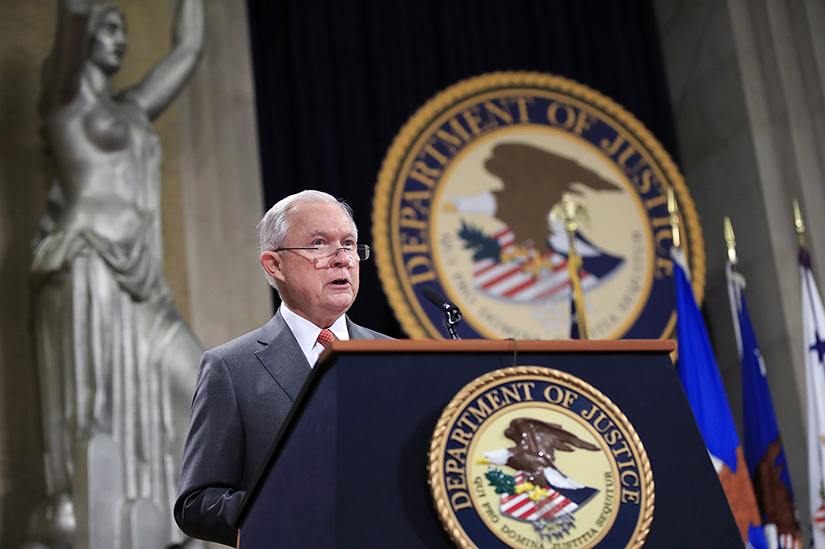 Attorney General Jeff Sessions spoke at a Religious Liberty Summit at the Department of Justice on July 30. Sessions says there’s a “dangerous movement” to erode protections for Americans to worship and believe as they choose.Photo Credits: Manuel Balce Ceneta | Associated PressWASHINGTON — Attorney General Jeff Sessions announced during a
Department of Justice summit in Washington that he is creating a
religious liberty task force to challenge what he called a dangerous
movement “eroding our great tradition of religious freedom.”
Attorney General Jeff Sessions spoke at a Religious Liberty Summit at the Department of Justice on July 30. Sessions says there’s a “dangerous movement” to erode protections for Americans to worship and believe as they choose.Photo Credits: Manuel Balce Ceneta | Associated PressWASHINGTON — Attorney General Jeff Sessions announced during a
Department of Justice summit in Washington that he is creating a
religious liberty task force to challenge what he called a dangerous
movement “eroding our great tradition of religious freedom.”
Sessions
said July 30 the task force is an outgrowth of President Trump’s
executive order directing agencies to protect religious liberty, and he
said it would help Justice Department employees remember that it is
their duty to accommodate people of faith.
“This administration is
animated by that same American view that has led us for 242 years —
that every American has a right to believe and worship and exercise
their faith in the public square,” Sessions said at the summit. The
Trump administration last week emphasized religious freedom in a
three-day State Department summit.
But Sessions also alluded to
the fears of some Americans that the freedom to practice their faith has
been under attack. He spoke of nuns “ordered to buy contraceptives,” a
reference to an Obama-era contraception mandate. The mandate didn’t
force the nuns to buy contraceptives but to cover the costs of
contraceptives in their employees’ health plans.
“Religious
Americans are no longer an afterthought,” he said. “We will take
potential burdens on one’s conscience into consideration before we issue
regulations or policies.”
Speaking at the summit alongside
Sessions were a host of religious leaders, including Archbishop Joseph
Kurtz, chairman of the Committee for Religious Liberty for the U.S.
Conference of Catholic Bishops, as well as Jack Phillips, the Colorado
baker who won a Supreme Court case after refusing to bake a cake for a
gay couple’s wedding.
During a panel discussion, a host of
religious leaders described their personal religious liberty battles.
They included a Chabad rabbi who fought opposition to his building a
synagogue in Boca Raton, Fla., a Sikh lawyer who refused to shave his
beard and take off his turban to accept a job and Phillips, the
evangelical Christian who wouldn’t bake the cake.
Sessions praised
Phillips for his “bravery” in his Masterpiece Cakeshop legal challenge.
Others, including Archbishop Kurtz and Heritage Foundation executive
Emilie Kao, said the country ought to defend the rights of faith-based
adoption agencies to prohibit same-sex couples from adopting children.
“When
activists try to force Christian ministries into violating their
consciences, they force Christians into a bind,” Archbishop Kurtz said.
“We cannot reject our commitments to service, nor can we turn away from
our commitment to the truth about the human person.”